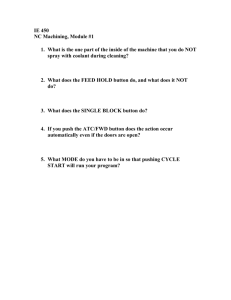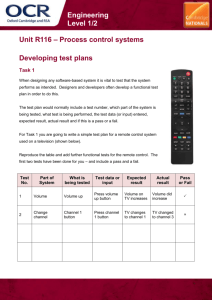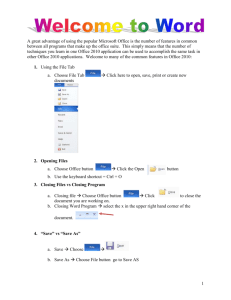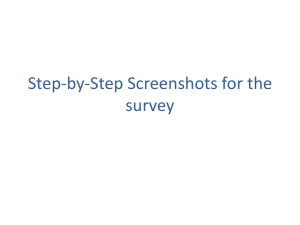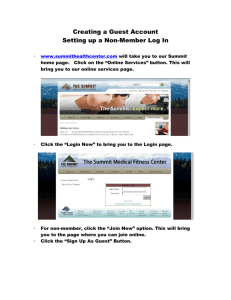Outlook 2013 - CustomGuide
advertisement
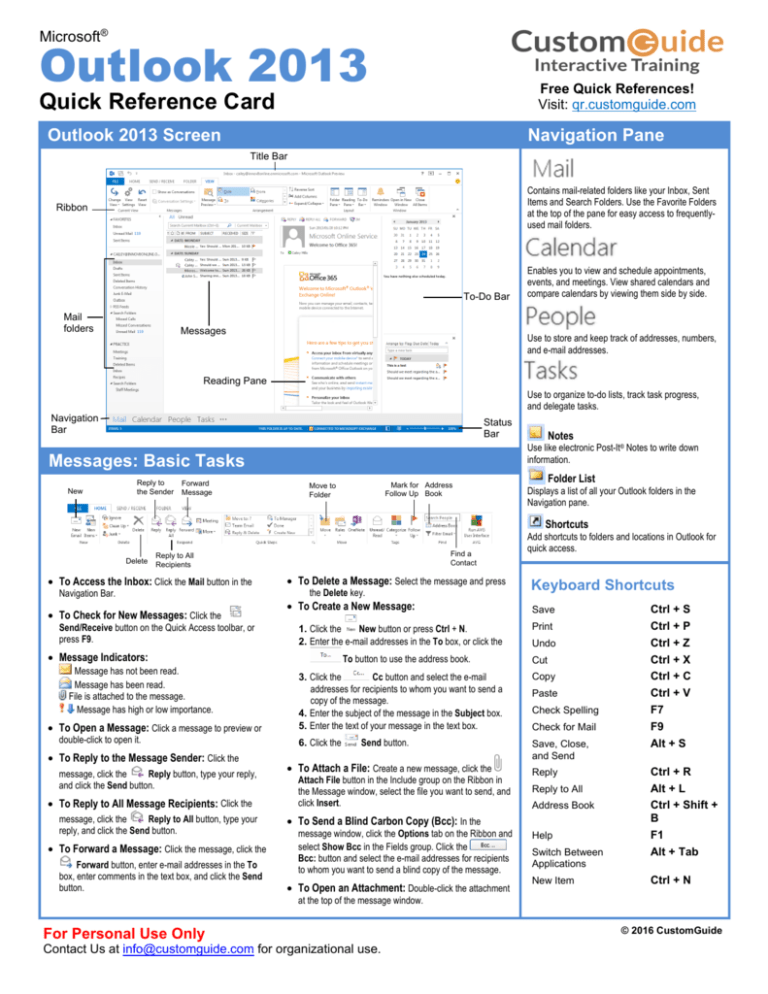
Microsoft® Outlook 2013 Free Quick References! Visit: qr.customguide.com Quick Reference Card Outlook 2013 Screen Navigation Pane Title Bar Contains mail-related folders like your Inbox, Sent Items and Search Folders. Use the Favorite Folders at the top of the pane for easy access to frequentlyused mail folders. Ribbon To-Do Bar Mail folders Messages Enables you to view and schedule appointments, events, and meetings. View shared calendars and compare calendars by viewing them side by side. Use to store and keep track of addresses, numbers, and e-mail addresses. Reading Pane Use to organize to-do lists, track task progress, and delegate tasks. Navigation Bar Status Bar Messages: Basic Tasks New Reply to the Sender Forward Message Notes Use like electronic Post-It® Notes to write down information. Mark for Address Follow Up Book Move to Folder Folder List Displays a list of all your Outlook folders in the Navigation pane. Shortcuts Delete Find a Contact Reply to All Recipients To Access the Inbox: Click the Mail button in the Navigation Bar. To Check for New Messages: Click the Send/Receive button on the Quick Access toolbar, or press F9. To Delete a Message: Select the message and press Keyboard Shortcuts To Create a New Message: Save the Delete key. 1. Click the New button or press Ctrl + N. 2. Enter the e-mail addresses in the To box, or click the Message Indicators: Message has not been read. Message has been read. File is attached to the message. Message has high or low importance. To Open a Message: Click a message to preview or double-click to open it. To Reply to the Message Sender: Click the message, click the Reply button, type your reply, and click the Send button. To Reply to All Message Recipients: Click the message, click the Reply to All button, type your reply, and click the Send button. To Forward a Message: Click the message, click the Forward button, enter e-mail addresses in the To box, enter comments in the text box, and click the Send button. Add shortcuts to folders and locations in Outlook for quick access. To button to use the address book. Print Undo Cut 3. Click the Cc button and select the e-mail addresses for recipients to whom you want to send a copy of the message. 4. Enter the subject of the message in the Subject box. 5. Enter the text of your message in the text box. Copy 6. Click the Save, Close, and Send Send button. To Attach a File: Create a new message, click the Attach File button in the Include group on the Ribbon in the Message window, select the file you want to send, and click Insert. Paste Check Spelling Check for Mail Reply Reply to All Address Book To Send a Blind Carbon Copy (Bcc): In the message window, click the Options tab on the Ribbon and select Show Bcc in the Fields group. Click the Bcc: button and select the e-mail addresses for recipients to whom you want to send a blind copy of the message. To Open an Attachment: Double-click the attachment Help Switch Between Applications New Item Ctrl + S Ctrl + P Ctrl + Z Ctrl + X Ctrl + C Ctrl + V F7 F9 Alt + S Ctrl + R Alt + L Ctrl + Shift + B F1 Alt + Tab Ctrl + N at the top of the message window. For Personal Use Only Contact Us at info@customguide.com for organizational use. © 2016 CustomGuide Message Window Features Like in Outlook 2010, the File menu and Ribbon replace the Office button and Standard Toolbar in Outlook 2013. Quick Access Toolbar Ribbon Messages: Advanced Tasks To Flag a Message as a To-Do Item: Right-click the message, select Follow Up from the contextual menu, and select a flag. Or, click the flag icon on the message. Or, select the message, click the Follow Up button on the Ribbon and select a flag. To Clear a Flagged Message: Right-click the message, select Follow Up from the contextual menu, and select Clear Flag. To Categorize a Message by Color: Click the Quick Click icon on the message. Or, right-click the message, select Categorize from the contextual menu, and select a color category. Or, select the message, click the Categorize button on the Ribbon, and select a flag. To Recall a Message: Open the Sent Items folder. Double-click the message, click the Actions button in the Move group on the Ribbon, and select Recall This Message. Choose to delete the message or replace the message with a new one in the dialog box and click OK. You can only recall a message if you are using MS Exchange Server and the recipient has not opened it. To Resend a Message: Open the Sent Items folder. Double-click the message, click the Actions button in the Move group on the Ribbon, and select Resend This Message. Enter new recipients in the message window and click Send. To Save a Message as a Draft: Click the Save button on the Quick Access Toolbar in the message window. The message appears in the Drafts folder. To Move an Item to a Different Folder: Select the item, click the Move to Folder button and select the destination folder. Or, click and drag the item to a different folder in the Navigation Pane. Calendar To Create a Distribution List: Click the New Items button arrow on the Ribbon and point to More Items and select Contact Group. Click Add Members in the Members group on the Ribbon, select the location of the contacts you wish to use and select a name in the list. Click the Members button and repeat for each name to be added. Click OK, then click Save & Close in the Actions group. To Create a Signature: Go to File, select Options and click the Mail tab. Click the Signatures button, and create the new signature. To Change a Message’s Options: In the message window, click the Options tab on the Ribbon and click the More Options Dialog Box Launcher . Here you can specify the level of importance or sensitivity of the message, add voting buttons to the message, indicate where replies should be sent to, choose to receive read receipts and encrypt the message or delay its delivery. To Use the Rules Wizard: 1. Make sure that you’re in the Inbox. 2. Click File on the menu bar, click the Info tab select Manage Rules and Alerts, and click the New Rule button. 3. Select the type of rule you want to create and click Next. 4. Click the first piece of underlined text in the Step 2 box, which may be people or distribution lists, specific words, etc. 5. Specify the criteria—a person’s name, a keyword, etc.—and click OK. 6. Click the next piece of underlined text in the Step 2 box and specify the name of the folder where you want to move the messages or the action you want done to the message. 7. Click Finish to complete the rule and click OK. Contacts New Appointment To View Your Contacts: Click the People button in the Navigation Bar. To Create a New Contact: Click the New button on the Ribbon. To Edit a Contact: Double-click the contact. To Find a Contact: Type words to search for in the Search Contacts box. Go to Today View Group Schedules Share Calendar To View the Calendar: Click the Calendar button in the Navigation Bar. To Delete a Contact: Select the contact and press the Delete key. To Change Views: Select the desired view in the Current View section of the Contacts Navigation pane. To Change Views: Click the View tab on the menu bar and select the desired view. Tasks and To-Do Items To Schedule an Appointment: Click the To View Your Tasks: Click the Tasks button in the Navigation Bar. Or, click one of the Day, Week, or Month view buttons. New button or press Ctrl + N. To Schedule a Recurring Appointment: Click New Items on the Ribbon and select Appointment from the menu. Click the Options arrow and then the Recurrence button. Fill in the fields and click OK. To Schedule a Meeting Request: Click the New Meeting button on the Ribbon and in the To…field type the contact that you wish to include. To Schedule an All Day Event: Click New Items arrow on the Ribbon and select New All Day Event from the menu. To Reschedule an Item: Double-click the meeting, appointment, or event, make your changes and click the Save & Close button. For Personal Use Only Contact Us at info@customguide.com for organizational use. To Create a New Task: Click the New button, press <Ctrl + <N, or type a new task in the text box at the top of the window or in the “Type a new task” box in the ToDo Bar. To Complete a Task: In Simple List view, check the task’s check box. To Delete a Task: Select the task and press the Delete key. To Create a Recurring Task: Double-click the task and click the Recurrence button on the Ribbon. To Assign a Task: Double-click the task, click the Assign Task button in the Manage Task group on the Ribbon, enter the person’s name in the To box, and click Send. © 2016 CustomGuide We hope you enjoy this free quick reference! Please review our other training products; see the samples below. Please Contact us for a Free Trial! 612.871.5004 | info@customguide.com Interactive Training for Over 2,000 Topics: Office 2016 for Windows Excel 2016 Outlook 2016 PowerPoint 2016 Word 2016 Office 2016 for Mac Excel 2016 Outlook 2016 PowerPoint 2016 Word 2016 Office 365 OneDrive for Business Skype for Business Office 2013 Excel 2013 OneNote 2013 Outlook 2013 PowerPoint 2013 SharePoint 2013 Word 2013 Operating Systems Windows 10 Windows 8 Windows 7 Computer Basics Mac OS Also Available Soft Skills Courses Spanish Editions Each Course Includes: Interactive Tutorials Customizable Courseware Get hands‐on training with bite‐sized tutorials that recreate the experience of using actual software. SCORM‐compatible for your LMS! View Sample Why write training materials when we’ve done it for you? Training manuals, practice files, and instructor guides with unlimited printing rights! View Sample Interactive Assessments Quick References How much do your users really know? Accurately measure skills with realistic software simulations. SCORM‐compatible for your LMS! View Sample Handy “cheat sheets” with shortcuts, tips, and tricks. Free for personal use! View Samples Over 3,000 Companies Rely on CustomGuide
